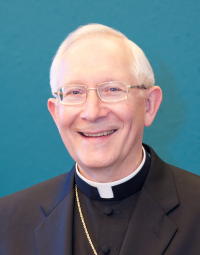
Archbishop Leonard P. Blair
One of the signs of human maturity is an honest acknowledgement of how little we really know, of how much we have yet to learn in life. This is especially evident when we encounter people or situations that inspire or challenge us.
Imagine for a moment the spiritual growth of the first disciples in the company of Jesus. No doubt they were lifelong observant Jews who knew and practiced their faith. Yet moved by the person of Jesus, one of them said to him, “Lord, teach us to pray.” (Lk 11:1) The Son of God was clearly inspiring them to something more than they had known, and his answer to the request was to teach them the “Our Father.” Perhaps we are tempted to think of prayer only as words used to ask for divine deliverance from suffering or trouble, or when we want something from God. But St. Augustine goes to the heart of the matter when he says that prayer is not about informing God about our needs, or persuading God to grant them. God already knows our needs before we ask, and his loving providence governs everything. Rather, prayer is an opportunity for us to “exercise” our desires, so that our minds and hearts may be widened to receive what God is prepared to give, namely Himself.
Our late Pope Benedict captured beautifully the Lenten aspect of prayer: “When we pray properly we undergo a process of inner purification which opens us up to God and thus to our fellow human beings as well. In prayer we must learn what we can truly ask of God — what is worthy of God. We must learn that we cannot pray against others. We must learn that we cannot ask for the superficial and comfortable things that we desire at this moment — that meager, misplaced hope that leads us away from God. We must learn to purify our desires and our hopes. We must free ourselves from the hidden lies with which we deceive ourselves. God sees through them, and when we come before God, we too are forced to recognize them.” (Spe Salvi, no. 33)
Another great theologian, Hans Urs von Balthasar, expressed something similar that challenges us during Lent when he wrote: “Prayers are words in the language of God, which is spoken and understood in heaven. There a purely earthly and egotistical language could be neither spoken nor understood … There is room within this space for the whole world with all its concerns; but in order to be transformed into authentic prayer, worldly concerns must expressly be transferred into this [heavenly] space.” (The Threefold Garland, p.122f )
When all around us we see the need for a rekindling the practice of the Catholic Faith in our archdiocese, nothing is more important than that we deepen our prayer: for ourselves, certainly, but also for the Church, for the spiritual well-being of our family, neighbors and our world. Lent is a perfect time to reflect on the “change of heart” to which the Lord calls us. To pray “as Jesus taught us” means more than just using his words. It also means measuring our desires and intentions by the standard of Jesus’ own. If we cannot imagine our prayer on the lips of Jesus, then God is calling us to a greater spiritual maturity, to deeper conversion, which is what Lent is all about.
